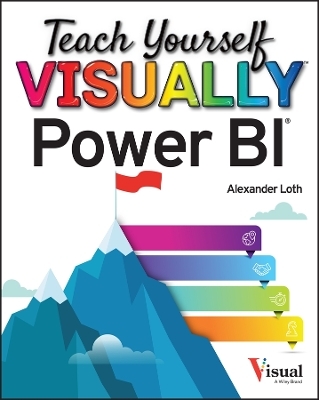
Teach Yourself VISUALLY Power BI
Visual (Verlag)
978-1-119-90377-2 (ISBN)
Teach Yourself VISUALLY Power BI collects all the resources you need to master the everyday use of Microsoft's powerful data visualization software and delivers them in a single, easy-to-use volume. Fully illustrated, step-by-step instructions are combined with crystal-clear screenshots that walk you through the basic and advanced functions of Microsoft Power BI.
Teach Yourself VISUALLY Power BI offers the best visual learning techniques with complete source material about the interface and substance of Power BI, as well as:
Stepwise guidance on working with, transforming, and processing data sources
Instructions for customizing data visualizations to create informative and presentation-ready charts and graphs
Full-color, two-page tutorials on the more advanced features of Power BI, including app integrations and data access with DAX
The fastest, easiest way for visual learners to get a handle on Microsoft Power BI, Teach Yourself VISUALLY Power BI is a can't-miss resource, loaded with useful tips for newbies and experts alike.
Chapter 1 Getting Started with Power BI
What Is Power BI? 4
Understanding the Different Components of Power BI 6
Understanding Power BI as Part of the Power Platform 7
Install Power BI Desktop 8
Start and Pin Power BI Desktop 10
Explore the Power BI Workspace 12
Chapter 2 Connecting Power BI to Your Data
Grasp How Power Query Editor Works with Power BI Desktop 18
Connect Power BI Desktop to a Local File 20
Save, Close, and Open Power BI Reports 22
Start Working with the Sample Dataset 24
Connect to a Power BI Dataset 28
Connect to a SharePoint List 30
Connect to a SQL Server Database 34
Chapter 3 Cleaning and Shaping Data
Remove Duplicate Values 40
Replace Values in a Column 42
Split a Column Using a Delimiter 44
Group Data 46
Add a Calculated Column 48
Add an Index Column 50
Chapter 4 Modeling Data in Model View
Create Dimension Tables 54
Create Relationships Between Tables 58
Create a Star Schema 62
Create a Hierarchical Schema 64
Using the Properties Pane 70
Chapter 5 Creating Basic Visualizations
Create a Bar Chart 74
Apply Filters to Visuals 76
Format the Y-Axis of a Bar Chart 78
Format the X-Axis of a Bar Chart 80
Add and Format the Data Category of a Bar Chart 82
Move a Bar Chart’s Legend and Add Gridlines 84
Add a Zoom Slider and Update Bar Colors 86
Add Data Labels to a Bar Chart 88
Add an Image to the Plot Area Background 90
Create a Line Chart or Area Chart 92
Format the Axes of a Line or Area Chart 94
Add a Legend to a Line or Area Chart 96
Move the Legend and Add Gridlines to a Line or Area Chart 98
Add a Zoom Slider and Steps to a Line or Area Chart 100
Add Data Markers and Labels to a Line or Area Chart 102
Format the Data Labels of a Line or Area Chart 104
Chapter 6 Creating Advanced Data Visualizations
Create and Format a Gauge Chart 108
Create and Format a KPI Visual 112
Create a Matrix Visual 116
Format a Matrix Visual 118
Format the Values and Column Headers of a Matrix Visual 120
Format the Row Headers of a Matrix Visual 122
Format the Row Subtotals and Grand Totals of a Matrix Visual 124
Format the Specific Column and Cell Elements of a Matrix Visual 126
Create a Waterfall Chart 128
Format a Waterfall Chart 130
Format the X-Axis and Legend of a Waterfall Chart 132
Add and Format Breakdowns in a Waterfall Chart 134
Create, Format, and Label a Funnel Chart 136
Create a Pie Chart or Donut Chart 140
Format a Pie Chart or Donut Chart 142
Create a Treemap Chart 144
Format a Treemap Chart 146
Chapter 7 Showing Geographic Data on Maps
Create a Proportional Symbol Map 150
Create a Choropleth Map 152
Add Conditional Formatting to a Choropleth Map 154
Enable Power BI’s Preview Features 156
Create an Isarithmic Map 158
Create a Skyscraper Map 160
Chapter 8 Using Calculated Columns and DAX
Understanding DAX and Why You Should Use It 164
Add All Numbers in a Column 166
Perform Division 168
Check a Condition 170
Count the Number of Cells in a Column 172
Return the Average of All Numbers in a Column 174
Join Two Text Strings into One Text String 176
Apply Conditional Formatting in Tables 178
Chapter 9 Using Analytics and Machine Learning
Identify Outliers 184
Find Groups of Similar Data by Clustering 186
Create a Dataflow 188
Apply Binary Prediction with AutoML 192
Chapter 10 Creating Interactive Reports
Planning to Create a Report 198
Start a Report and Add a Title 200
Add Visuals to a Report 202
Add Slicers to a Report 206
Control Which Visuals and Slicers Interact 208
Enable and Control Drill-Through Actions 210
Split a Page into Sections 214
Add Bookmarks and Navigation to a Report 218
Chapter 11 Publishing Reports and Dashboards
Set Up a Workspace 224
Ask Questions About the Data 226
Publish a Report to the Power BI Service 228
Set Up Row-Level Security 230
Add Tiles to a Dashboard 232
Share a Dashboard 234
Schedule Data Refreshes 236
Publish a Report to the Web 238
Index 240
| Erscheinungsdatum | 05.05.2023 |
|---|---|
| Reihe/Serie | Teach Yourself VISUALLY (Tech) |
| Sprache | englisch |
| Maße | 188 x 234 mm |
| Gewicht | 499 g |
| Themenwelt | Informatik ► Datenbanken ► Data Warehouse / Data Mining |
| Mathematik / Informatik ► Informatik ► Netzwerke | |
| Mathematik / Informatik ► Mathematik | |
| ISBN-10 | 1-119-90377-7 / 1119903777 |
| ISBN-13 | 978-1-119-90377-2 / 9781119903772 |
| Zustand | Neuware |
| Informationen gemäß Produktsicherheitsverordnung (GPSR) | |
| Haben Sie eine Frage zum Produkt? |
aus dem Bereich


